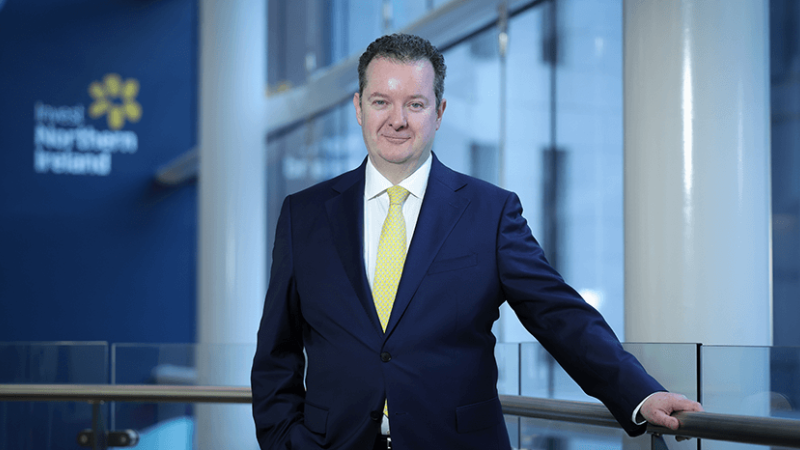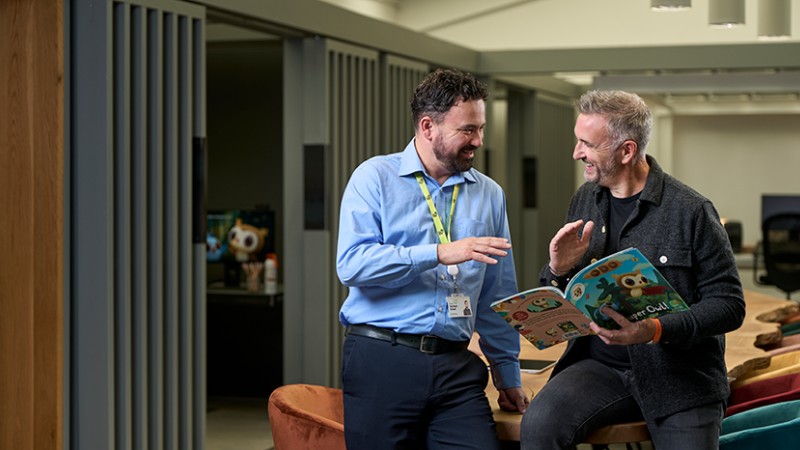The sky isn’t the limit for Northern Ireland’s rising space sector

This article was originally published in the August edition of Ulster Business.
Young Belfast engineer, Harry Ferguson, built his own aircraft in 1909 and flew it at Hillsborough Park.
Shorts, based in Belfast, was the first company in the world to make production aircraft.
Fast forward to the present, and it is highly anticipated that Dr. Rosemary Coogan, born in Belfast, will be the first astronaut from the UK or Ireland to walk on the moon.
Northern Ireland has always aimed high – and now we have our sights set on the stars.
Northern Ireland’s combined aerospace, defence and security industry generates around £2.2bn in annual revenues. Now, our advanced manufacturing companies are exploring opportunities within the growing space sector.
In 2023, the UK Space Conference was hosted in Belfast for the first time. Nearly 2000 industry professionals, academics, and government officials from all around the world came to the city to discuss the future of the space industry.
In June 2025, the UK Space Agency, in partnership with the Satellite Applications Catapult, brought the In-Orbit Servicing, Assembly and Manufacturing (ISAM) Conference to Belfast.
The global space economy is changing at a rapid pace, and ISAM is set to shape this economy. Northern Ireland is well-placed to become a leader in the emerging ISAM marketplace.
Conferences such as ISAM and the UK Space Conference allow us to showcase Northern Ireland’s capabilities in the space industry, which is vital to boosting investment here.
The space industry is divided into two sectors. The upstream sector refers to manufacturing and launching rockets and satellites; the downstream sector is ground-based services, such as data and communications.
Northern Ireland has a strong base for both capabilities. Our Advanced Manufacturing and Engineering sector is home to many international companies. Spirit AeroSystems and Thales Alenia Space are leading the way in space hardware production. It's exciting to know that within the next decade, thrusters manufactured by Thales Alenia Space in Northern Ireland will be taking cargo to the moon.
Our thriving cluster of cybersecurity and technology companies are well-placed to protect critical space infrastructure, such as satellites, from evolving threats.
Northern Ireland companies like Angoka, a digital infrastructure company, are leading the way in critical machine-to-machine communication integrity and data provenance, creating trusted connections, even in untrustworthy networks.
Secure communication between ground and satellites, drone and satellites, and satellites to satellites will be at the centre of the space economy, allowing for in-space manufacturing and assembly and improved ground-based data security.
Investment in the sector is crucial to remaining competitive and innovative. Invest NI has supported the growth of the sector by providing financial assistance and aiding investment decisions in the City and Growth Deals, which will be transformational to the future of the space industry.
The Advanced Manufacturing Innovation Centre (AMIC), part of the Belfast Region Deal, launched the Space Enterprise Lab in collaboration with the Satellite Applications Catapult. Part of a UK-wide network, the Space Enterprise Lab will foster collaboration between our local space sector and the UK space ecosystem.
Projects like the £37.6 million Digital Twin Centre, which recently opened its doors in Belfast, will accelerate industry adoption of digital twin technology. A digital twin is a digital replica of a physical asset, process or system that can help many organisations simulate real situations and their outcomes, ultimately allowing them to make better decisions.
Dual market access also gives Northern Ireland manufacturing businesses a competitive advantage over GB and EU counterparts due to frictionless trading arrangements. Free trade between GB and the EU without custom checks, origin requirements, or tariffs, allows NI businesses within the space industry to compete on a stronger footing in a multi-trillion pound trade market. This opens up a wealth of potential and opportunity to tap into supply chains across Europe.
The space industry is vast, and its opportunities are plentiful. Northern Ireland’s contribution to the sector is growing year on year, and if we continue to collaborate, innovate, and invest in our capabilities, the space industry will become a star player in our economy.



Comments